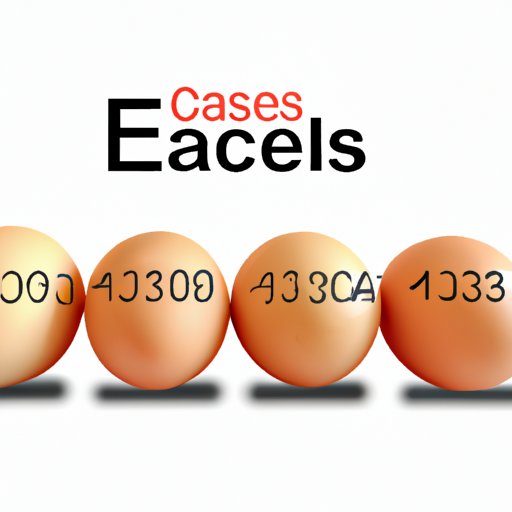Introduction
Eggs are a staple in many households, loved by both children and adults. But for those who are tracking their calorie intake, eating eggs may raise concerns. Understanding the calorie content of eggs and their nutritional value can help individuals make informed food choices. In this article, we will explore how many calories are in an egg and how to incorporate it into your diet for optimal health.
How Many Calories Are in an Egg?
A typical egg contains about 70-80 calories. The calorie count may vary depending on the size of the egg. A small egg weighs around 38 grams and contains 54 calories. A medium egg weighs about 44 grams and contains 63 calories. A large egg weighs around 50 grams and contains 72 calories, while a jumbo egg can contain up to 90 calories.
For comparison, a slice of bread contains around 100 calories, a banana contains about 90 calories, and a serving of chicken contains around 200 calories.
The Incredible Nutritional Value of Eggs: Breaking Down the Calorie Count
Eggs are packed with essential nutrients that our body needs to function properly. One large egg contains about 6 grams of protein and 5 grams of healthy fats. Eggs are also rich in vitamins and minerals such as vitamin D, vitamin B12, iron, and selenium.
Moreover, eggs are a great source of choline, a nutrient that is important for brain function and memory. Studies have shown that consuming eggs can improve cognitive function in adults.
Therefore, it is safe to say that eggs are an excellent addition to a balanced and healthy diet.
Eggs for Weight Loss: Understanding Their Calorie Content and Impact
Contrary to popular belief, including eggs in your diet can help with weight loss. Not only are they low in calories, but the high protein content in eggs can increase feelings of fullness, leading to a lower calorie intake throughout the day.
One study found that individuals who ate eggs for breakfast consumed fewer calories at lunchtime compared to those who ate a bagel for breakfast. Additionally, those who consumed eggs for breakfast lost more weight than those who ate a bagel.
Calories in Eggs: How It Varies Based on Cooking Methods
How you prepare your eggs can impact their calorie content. Frying your eggs in oil or butter will increase their calorie count. For a low-calorie option, it is best to boil or poach your eggs.
If you prefer fried eggs, consider using a non-stick pan or cooking spray and limit the amount of oil or butter used to keep the calorie count low. Additionally, using egg whites instead of whole eggs can dramatically decrease calorie intake.
Are All Eggs Created Equal? Analyzing Calorie Differences Between Cage-Free, Organic, and Conventional Eggs
The calorie count of an egg may vary depending on the type of egg you consume. Cage-free and organic eggs are often touted as healthier options, but their calorie content is not significantly different from conventional eggs. However, they may have a higher nutrient content due to a better diet and living conditions of the hens that lay them.
From Breakfast to Dinner: Incorporating Egg Calories into Your Daily Meal Plan
There are countless ways to incorporate eggs into your meal plan throughout the day. For breakfast, try a veggie-packed omelet or scrambled eggs with whole-wheat toast and avocado. For lunch or dinner, eggs can be added to salads or used to top off a homemade veggie burger. Hard-boiled eggs also make for a convenient and low-calorie snack option.
Here is an example of a daily meal plan that incorporates eggs:
- Breakfast: Veggie omelet with a side of whole-wheat toast and fruit
- Snack: Hard-boiled egg with a handful of almonds
- Lunch: Spinach salad with grilled chicken and boiled egg
- Snack: Apple slices with a tablespoon of nut butter
- Dinner: Homemade turkey burger topped with a fried egg and side of sweet potato fries
Conclusion
Understanding the calorie content of eggs and their nutritional value is essential for maintaining a healthy and balanced diet. Eggs are a great source of protein, healthy fats, and essential vitamins and minerals. They can also aid in weight loss when consumed as part of a healthy meal plan. Incorporating eggs into your diet is easy and versatile, making it an excellent addition to any meal.
